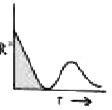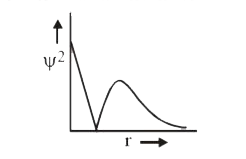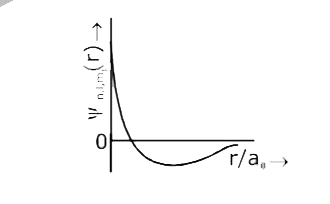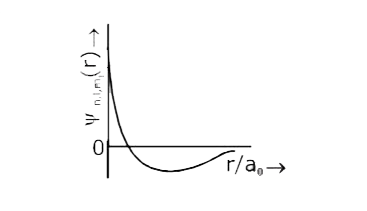Statement : All s-orbitla in H-atom corresponds to a non-zero probability density at nucleus .
Explanation : The probability density is given by and .
If both assertion and reason are true and the reason is the correct explanation of the assertion.
If both assertion and reason are true but reason is not the correct explanation of the assertion.
If assertion is true but reason is false
If assertion is false but reason is true.
The correct Answer is:A
(a) at .
Topper's Solved these Questions
- ATOMIC STRUCTUREBOOK - A2ZCHAPTER - ATOMIC STRUCTUREEXERCISE - AIPMT/NEET Questions
59 Videos
- ATOMIC STRUCTUREBOOK - A2ZCHAPTER - ATOMIC STRUCTUREEXERCISE - AIIMS Questions
16 Videos
- ATOMIC STRUCTUREBOOK - A2ZCHAPTER - ATOMIC STRUCTUREEXERCISE - Quantum Numbers, Orbitial'S Shape, Electronic Configuration
91 Videos
- CHEMICAL BONDING AND MOLECULAR STRUCTUREBOOK - A2ZCHAPTER - CHEMICAL BONDING AND MOLECULAR STRUCTUREEXERCISE - Section D - Chapter End Test
30 Videos
Similar Questions
Knowledge Check
The probability density curve for 2s electron appears like
A B
B C
C D
D
The probability density curve for 2s electron appears like
A B
B C
C D
D
For s-orbitals, since (Ψ orbitals wave function) is independent of angles, the probability density (Ψ2) is
Aalso independent of anglesBspherically symmetricCboth (a) and (b) are correctDboth (a) and (b) are incorrect
For the hydrogen atom in its ground state, calculate (a) the probability density y (r) and (b) the radial probability density Ψ2(r) for r= a, where a is the Bohr radius.
View SolutionPredict which of the following statements are true or false.
Ψ2 represents probability density .
View SolutionThe following graph between Ψ2 probability density and distance from the nucleus represents -

View SolutionWave function ψn,lm1 is a mathematical function, which vlaue depends on spherical polar coordinates (r,θ,ϕ) and titrated from quantum numbers n,landm1. Here, r is distance from nucleus, θ is Colatitude and ϕis azimuth. In mathematical functions which are given below table, Z is atomic number and a0 is Bohr Radius.
Column 1
(I) 1s Orbital
(II) 2s Orbital
(III)2pz Orbital
(IV) 3d2z Orbital
Column 2
(i) ψn,l,m1∝(za0)3zezra0
(ii) a radial node
(iii) ψn,l,m1∝(Za0)5ze(2r)re(2r2a0)cosθ
(iv) xy-plane is node
Column 3

(Q) nucleus per probability density ∝1a30
(R) nucleus per probability density is maximum
(S) energy requires to excited a electron from level n=2 to n=4,is2732 times
to energy requires to excited a electron from level n=2 to n=6
Which of the following options has correct combination for hydrogen atom ?
View SolutionWave function ψn,lm1 is a mathematical function, which vlaue depends on spherical polar coordinates (r,θ,ϕ) and titrated from quantum numbers n,landm1. Here, r is distance from nucleus, θ is Colatitude and ϕis azimuth. In mathematical functions which are given below table, Z is atomic number and a0 is Bohr Radius.
Column 1
(I) 1s Orbital
(II) 2s Orbital
(III)2pz Orbital
(IV) 3d2z Orbital
Column 2
(i) ψn,l,m1∝(za0)3zezra0
(ii) a radial node
(iii) ψn,l,m1∝(Za0)5ze(2r)re(2r2a0)cosθ
(iv) xy-plane is node
Column 3

(Q) nucleus per probability density ∝1a30
(R) nucleus per probability density is maximum
(S) energy requires to excited a electron from level n=2 to n=4,is2732 times
to energy requires to excited a electron from level n=2 to n=6
for He+ ion, which of the following option is incorrect ?
View Solution
